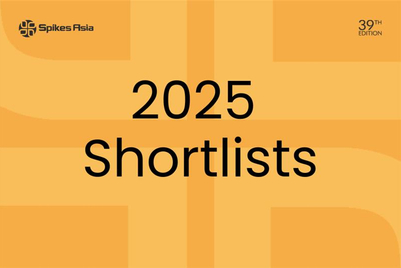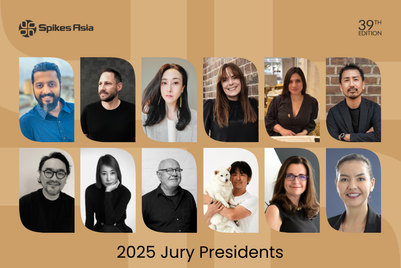
Design

Digital, Mobile, Digital Craft

Direct, Promo & Activation

Entertainment

Film Craft

Film, Print & Publishing, Print & Outdoor Craft

Healthcare

Media

Outdoor, Radio

PR
1) Yasuharu Sasaki, ECD, Dentsu Inc
Digital, Mobile & Digital Craft jury president

The overall quality of Digital is getting higher. We could see crazy ideas from Japan, nicely integrated campaigns from Australia and New Zealand, and data and AI cases from China.
Some people think that digital is just an efficient and less expensive method of advertising. However, I believe it has more potential. So, we looked for things that could move people emotionally and physically with the power of digital. My favorite campaign was ‘Snaplication’, which allowed young people to apply for a job with a 10-second video.
Now, digital can provoke conversations. It can provide experiences. Taking these advantages into consideration, there were a lot of entries that tackled social issues. We also saw a lot of great cases that empowered people through the power of technology and ideas.
In terms of technology, AI and AR are hot now. AI is still used mainly for PR purposes, but if creatives can properly combine ideas with AI, it will become a very powerful innovation.
2) Amit Akali, CCO, Medulla Communications
Healthcare jury president

While the overall number of entries was less than last year, the quality was higher. Probably because of declining award budgets, people entered more sensibly this year, and in our first shortlist we actually kept as many as 60 percent of the entries. We got more critical thereafter, but even then had a robust final shortlist of 47 pieces. There was some great work from across different countries, with the big winners being equally distributed amongst India, Australia and Thailand.
We wanted to reward work that solved health problems preferably for big healthcare brands. Also, Spikes is an Asian festival, so we were searching for work that relied on cultural traditions to connect with people. Keeping both these criteria in mind, the ‘Chitosan’ campaign from Thailand stood out for me. In fact, it was a close contender for the Grand Prix. It was probably the toughest brief ever – “We have a celebrity, we want to show the drug application – show that it’s a capsule which you swallow through your mouth and then it works on your thighs and belly.” The creative team worked magic with it. Every word, every scene was brilliantly executed and the jury never got tired of viewing it. ‘Corrupt cops’ as a behaviour was as Asian as it gets – while it was a Thai film the cop was exactly the same as the ones across India!
This year I think the work has come full circle. Brands across the board, be it fashion, insurance, beverage, FMCG have realised how important health is to their consumer and there’s some fantastic work, which is not just winning in healthcare but across categories. I was also part of the ‘Integrated’ and ‘Grand Prix for Good’ juries and felt proud when the big winners in healthcare won the Grand Prixes for both, ‘Integrated’ and ‘Good’.
The most important innovation for me is the focus on ideas over innovation. For years we’ve been obsessed with technology. I think now we’ve realised that the idea is most important, and innovation can then be used to bring the idea alive. All the big winners across categories were big ideas first. In fact the biggest winners; ‘Adidas Odds’, ‘Unusual Football Field’ and ‘Immunity Charm’ were actually non-tech, analog innovations.
3) Jeremy Craigen, global CCO, Innocean Worldwide
Entertainment jury president

Overall I thought the quality was quite weak when doing preliminary judging but, as always, when you get to the shortlist you are pleasantly surprised. The best work was nicely spread across the region and there were no arguments about any of the Spikes winners. The Grand Prix vote was unanimous.
“Entertainment” as a category is so broad a word and so subjective that we just let our guts do the voting. I had such an eclectic group of people on the jury it could have gone horribly wrong but it was a great experience. My standout piece of work, together with all the jury, was ‘Gravity Cat’. A crazy piece of film that gets better every time you see it. And intrinsically linked to the product. How refreshing.
I don’t think there were any trends in the Entertainment category, but there certainly were in Integrated and I think it is a worrying trend throughout our industry. Nine out of the 11 pieces of work on the shortlist had a “social cause” angle. Whether it was sport shoes or a soft drink, they all tried to find a voice that was bigger than the product itself, some more successfully than others. The cynical side of me sees this as award hunting. The other side says I hope this is for real.
4) Mark Tutssel, creative chair, Publicis Communications and global CCO, Leo Burnett Worldwide
Direct and Promo & Activation jury president

Awards are a barometer of the health of the industry, and judging by the work we saw, Asia-Pacific is in fine shape. What was most satisfying is that we saw award-winning work from virtually every country in the region. ‘Meet Graham’, ‘The Unusual Football Field Project’, ‘Adidas Odds’ and ‘The Immunity Charm’ are a testament to the calibre of future-facing work originating from APAC.
The jury was looking for work that moved people to act, and for brilliant ideas that generated interaction and created human value. The Grand Prix in Promo & Activation was one piece that stood out. It was a brand living its purpose. The property company AP in Thailand believes that "Space Can Change One's Life,” and demonstrated this by turning small, irregularly shaped neglected plots of land, scattered in densely populated urban areas, into unusually shaped football fields. A valuable and powerful humankind act.
One trend I noticed was that brands were truly delivering on their belief; why they exist. I've mentioned AP Thailand, but another was Adidas. This is a brand for and by athletes, with a simple yet powerful philosophy of "No athlete left behind". Adidas "Odds" simply looked to level the playing field, and in doing so created a new business idea.
I have always been obsessed with understanding human behaviour, so I’m excited about AI and advances in data science that will serve as undeniably powerful tools for insights that can fuel our work. But establishing a lifelong emotional relationship with people requires alchemy, the magic of creativity and technology coming together to bring to life ideas that move people to act.
5) Johnny Tan, ECD, 72andSunny APAC
Design jury president

Design is such an integral part of any kind of great work. There were several awesome pieces of work, and I think the Gold winners are a very good representative of that. Even beyond that, 'Adidas Odds', 'School of Justice' and 'Hearing test in disguise' and many more...were also among some of the other stand-out pieces I've seen this year. These weren't just great Asian work but rather, top world-class work, period.
On the design jury, we looked for a few main things. Work that pushed the boundaries of design. Smart, disruptive, brave work that demonstrated masterful craft. We wanted to celebrate brands that have deliberately used design as a way to create cultural impact and bring a transformative effect to the brand. Many of the best pieces of work have a "social good" angle to them. And that's a good trend. It's great to see creativity at its best; solving the world's problems in unconventional and surprising ways.
I am surprised to notice that the more 'traditional' channels are looking fairly thin. In a way, I kind of wish there were more stand-out pieces in logo designs, typography, rebranding work, packaging etc. These remain very powerful mediums and creative & designers should still thrive in them.
I think the strongest 'innovation’ this year was the return to the strength of an idea. In the past few years, we've seen loads of razzle dazzle in the world of cool hardware like VR. Several of the strongest pieces this year have gone back to more 'lo-fi' approaches. "The Unusual Football Field" and even "Meet Graham" were pretty traditional and incredibly simple, but their impact was astounding.
6) Debby Cheung, president, Ogilvy PR China/Hong Kong
PR jury president

Except for two or three cases that stood out, the overall quality of the entries was below my expectation. There were many entries from Japan, but unfortunately none stood out as a gold. The jury felt a lot of the cases lacked a big idea, as most of them were tactical solutions loosely packaged into an entry.
The winning entries had to have earned influence at their core. Besides, we were looking for a big idea which built the brand and created outstanding results. ‘Meet Graham’ was unanimously voted the Grand Prix winner because of its incredible idea and the true conversation it triggered both locally and globally.
More and more cases drew insights from data analysis, which was a very good thing to see. ‘Meet Graham’ went even further in using data to power its creative solution.
I have not seen anything that excited me at Spikes this year, in terms of innovation.












.jpg&h=334&w=500&q=100&v=20250320&c=1)
.jpg&h=334&w=500&q=100&v=20250320&c=1)
.jpg&h=334&w=500&q=100&v=20250320&c=1)




.png&h=334&w=500&q=100&v=20250320&c=1)

.png&h=334&w=500&q=100&v=20250320&c=1)

.jpg&h=268&w=401&q=100&v=20250320&c=1)





